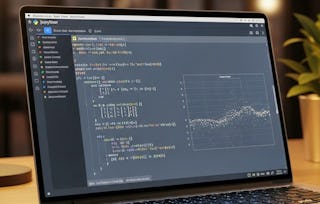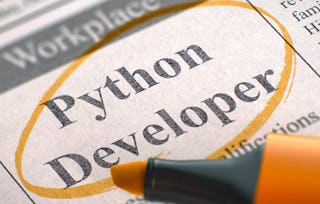In diesem Kurs lernen Sie die Datenstruktur Dictionary und benutzerdefinierte Funktionen kennen. Sie erfahren etwas über lokale und globale Variablen, optionale und Schlüsselwort-Parameterübergabe, benannte Funktionen und Lambda-Ausdrücke. Außerdem lernen Sie die Sortierfunktion von Python kennen und erfahren, wie Sie die Reihenfolge der Sortierung steuern können, indem Sie eine andere Funktion als Eingabe übergeben. In Ihrem Abschlussprojekt werden Sie simulierte Social Media-Daten aus einer Datei einlesen, Stimmungswerte berechnen und .csv-Dateien ausgeben. Der Kurs deckt die Kapitel 10-16 des Lehrbuchs "Grundlagen der Python-Programmierung" ab, das der (optionale und kostenlose) Begleittext zu diesem Kurs ist. Der Kurs ist gut für Sie geeignet, wenn Sie bereits den Kurs "Python-Grundlagen" belegt haben und weitere grundlegende Kenntnisse der Sprache Python erwerben möchten. Beide Kurse zusammen richten sich an Einsteiger in die Python-Programmierung, an diejenigen, die eine Auffrischung der Python-Grundlagen benötigen, oder an diejenigen, die bereits einige Erfahrungen mit der Python-Programmierung gemacht haben, aber eine tiefer gehende Darstellung und ein Vokabular für die Beschreibung und Argumentation von Programmen wünschen. Dies ist eine Fortsetzung des Kurses "Python-Grundlagen" (Kurs 1 der Python 3 Programming Specialization) und der zweite von fünf Kursen der Specialization.

Python-Funktionen, -Dateien und -Wörterbücher

Python-Funktionen, -Dateien und -Wörterbücher
Dieser Kurs ist Teil von Spezialisierung für Python 3 Programmierung
Unterrichtet in Deutsch (KI-Synchronisation)


Dozenten: Paul Resnick
151.801 bereits angemeldet
Bei enthalten
5,437 reviews
Was Sie lernen werden
Erkunden Sie die Wörterbuch-Datenstruktur und benutzerdefinierte Funktionen in Python.
Verstehen Sie Konzepte wie lokale und globale Variablen, Techniken zur Parameterübergabe, benannte Funktionen und Lambda-Ausdrücke.
Wenden Sie die Sortierfunktion von Python an und steuern Sie die Sortierreihenfolge mit eigenen Funktionen.
Erstellen Sie ein Abschlussprojekt, das die Analyse von Daten aus sozialen Medien und die Bearbeitung von CSV-Dateien beinhaltet.
Kompetenzen, die Sie erwerben
- Kategorie: Datenstrukturen
- Kategorie: Fehlersuche
- Kategorie: Daten importieren/exportieren
- Kategorie: Grundsätze der Programmierung
- Kategorie: Datei-E/A
- Kategorie: Python-Programmierung
- Kategorie: Funktionales Design
Wichtige Details

Zu Ihrem LinkedIn-Profil hinzufügen
Erfahren Sie, wie Mitarbeiter führender Unternehmen gefragte Kompetenzen erwerben.

Erweitern Sie Ihre Fachkenntnisse
- Lernen Sie neue Konzepte von Branchenexperten
- Gewinnen Sie ein Grundverständnis bestimmter Themen oder Tools
- Erwerben Sie berufsrelevante Kompetenzen durch praktische Projekte
- Erwerben Sie ein Berufszertifikat zur Vorlage

In diesem Kurs gibt es 5 Module
In der ersten Woche werden Sie anhand der Videovorlesungen und des Runestone-Lehrbuchs mit der Idee vertraut gemacht, Dateien als zusätzliche Datenquelle in Ihre Programme einzubinden. Sie werden lernen, wie man aus einer Datei liest, in eine Datei schreibt und wie man mit dem .csv-Datenformat arbeitet.
Das ist alles enthalten
20 Videos3 Lektüren1 Programmieraufgabe13 App-Elemente3 Unbewertete Labore
In Woche zwei werden sich die Videovorlesungen und das Runestone-Lehrbuch auf einen neuen Datentyp konzentrieren, nämlich Wörterbücher. Sie erhalten eine Einführung in die Funktionsweise von Wörterbüchern und üben dann, diese in Akkumulationsmustern zu verwenden, sowohl um ein Wörterbuch unter Verwendung des Musters zu erstellen als auch um das beste bzw. schlechteste Ergebnis unter Verwendung des Musters zu finden.
Das ist alles enthalten
15 Videos2 Programmieraufgaben10 App-Elemente1 Unbewertetes Labor
In Woche drei werden Sie in den Aufbau von Funktionen eingeführt. Bis zu diesem Zeitpunkt haben Sie zwar schon Funktionen in den Programmen verwendet, hatten aber noch keine Gelegenheit, eigene Funktionen zu schreiben. Dabei geht es unter anderem darum, wie man eine Funktion definiert, wie man Parameter einbezieht, wie man Daten aus einer Funktion zurückgibt, den lokalen oder globalen Geltungsbereich von Variablen und mögliche Nebeneffekte, die bei der Ausführung einer Funktion auftreten können. Schließlich befassen wir uns eingehender mit Tupeln und damit, wie das automatische Packen und Entpacken von Tupeln in Funktionen und in for-Schleifen verwendet werden kann.
Das ist alles enthalten
19 Videos2 Programmieraufgaben21 App-Elemente2 Unbewertete Labore
In Woche vier wird in den Videovorlesungen und im Runestone-Lehrbuch ein fortgeschrittener Iterationsmechanismus vorgestellt, die while-Schleife. Sie werden lernen, wie Sie diese Schleife verwenden, um Feedback von Benutzern zu erhalten, und wie Sie sie im Turtle-Modul anwenden, um Bilder zu zeichnen. Außerdem werden Sie mit fortgeschrittenen Funktionskonzepten vertraut gemacht, z.B. mit der Idee, dass Parameter optional und nicht erforderlich sind, und mit anonymen Funktionen unter Verwendung von Lambda.
Das ist alles enthalten
14 Videos2 Programmieraufgaben13 App-Elemente3 Unbewertete Labore
In der fünften Woche wird in den Videos und im Runestone-Lehrbuch ausführlich erklärt, wie man Python-Objekte sortiert - sowohl die Grundlagen als auch fortgeschrittenere Formen der Sortierung für Wörterbücher und wie man ein Unentschieden auflöst (wenn es dazu kommt). Die abschließende Kursbeurteilung wird ein Projekt sein, bei dem Sie gefälschte, automatisch generierte Daten von einer Social-Media-Website lesen sollen, um die Stimmungen in den sozialen Medien zu analysieren. Sie werden eine csv-Datei sowie Bilder von Diagrammen einreichen, die Ihre Ergebnisse veranschaulichen.
Das ist alles enthalten
16 Videos3 Lektüren2 Programmieraufgaben1 peer review7 App-Elemente1 Unbewertetes Labor
Erwerben Sie ein Karrierezertifikat.
Fügen Sie dieses Zeugnis Ihrem LinkedIn-Profil, Lebenslauf oder CV hinzu. Teilen Sie sie in Social Media und in Ihrer Leistungsbeurteilung.
Dozenten


Mehr von Softwareentwicklung entdecken
 Status: Kostenloser Testzeitraum
Status: Kostenloser Testzeitraum Status: Kostenloser Testzeitraum
Status: Kostenloser Testzeitraum Status: Kostenloser Testzeitraum
Status: Kostenloser TestzeitraumRice University
 Status: Kostenloser Testzeitraum
Status: Kostenloser Testzeitraum
Warum entscheiden sich Menschen für Coursera für ihre Karriere?

Felipe M.

Jennifer J.

Larry W.

Chaitanya A.
Bewertungen von Lernenden
- 5 stars
87,16 %
- 4 stars
11,16 %
- 3 stars
1,19 %
- 2 stars
0,16 %
- 1 star
0,31 %
Zeigt 3 von 5437 an
Geprüft am 6. Nov. 2019
The course met all my expectations and went beyond. The instructors' explanations were easy to understand and the innovative method of having a digital textbook was undoubtedly convenient.
Geprüft am 7. Jan. 2020
Very nice course, it could be a little bit challenging if you have no programming experience, but if you have done the past course and you put your attention you will definitely be able to pass it.
Geprüft am 28. Jan. 2020
Great follow-on from the basics with essential information. Well constructed series, well presented lessons, with great practice questions. I feel a big step closer to writing useful python code.

Neue Karrieremöglichkeiten mit Coursera Plus
Unbegrenzter Zugang zu 10,000+ Weltklasse-Kursen, praktischen Projekten und berufsqualifizierenden Zertifikatsprogrammen - alles in Ihrem Abonnement enthalten
Bringen Sie Ihre Karriere mit einem Online-Abschluss voran.
Erwerben Sie einen Abschluss von erstklassigen Universitäten – 100 % online
Schließen Sie sich mehr als 3.400 Unternehmen in aller Welt an, die sich für Coursera for Business entschieden haben.
Schulen Sie Ihre Mitarbeiter*innen, um sich in der digitalen Wirtschaft zu behaupten.
Häufig gestellte Fragen
Um Zugang zu den Kursmaterialien und Aufgaben zu erhalten und um ein Zertifikat zu erwerben, müssen Sie die Zertifikatserfahrung erwerben, wenn Sie sich für einen Kurs anmelden. Sie können stattdessen eine kostenlose Testversion ausprobieren oder finanzielle Unterstützung beantragen. Der Kurs kann stattdessen die Option "Vollständiger Kurs, kein Zertifikat" anbieten. Mit dieser Option können Sie alle Kursmaterialien einsehen, die erforderlichen Bewertungen abgeben und eine Abschlussnote erhalten. Dies bedeutet auch, dass Sie kein Zertifikat erwerben können.
Wenn Sie sich für den Kurs einschreiben, erhalten Sie Zugang zu allen Kursen der Spezialisierung, und Sie erhalten ein Zertifikat, wenn Sie die Arbeit abgeschlossen haben. Ihr elektronisches Zertifikat wird Ihrer Seite "Leistungen" hinzugefügt - von dort aus können Sie Ihr Zertifikat ausdrucken oder Ihrem LinkedIn-Profil hinzufügen.
Ja. Für ausgewählte Lernprogramme können Sie eine finanzielle Unterstützung oder ein Stipendium beantragen, wenn Sie die Anmeldungsgebühr nicht aufbringen können. Wenn für das von Ihnen gewählte Lernprogramm eine finanzielle Unterstützung oder ein Stipendium verfügbar ist, finden Sie auf der Beschreibungsseite einen Link zur Beantragung.
Weitere Fragen
Finanzielle Unterstützung verfügbar,
¹ Einige Aufgaben in diesem Kurs werden mit AI bewertet. Für diese Aufgaben werden Ihre Daten in Übereinstimmung mit Datenschutzhinweis von Courseraverwendet.

